To mark 41 years since the formation of the Jewish Book Council, we take a look at the sources we hold relating to the organisation in MS385.
![Jewish Book Week event, 1952 [MS385 A4040 4/1]](https://specialcollectionsuniversityofsouthampton.files.wordpress.com/2018/12/JBC-Meeting-c.1950s-MS385-A4040-4_1.jpg?w=500)
Jewish Book Week event, 1952 [MS385 A4040/4/1]
The Council started in 1947 as a small group of people led by Dr George Webber, who was a Hebraist and lifelong book fanatic. At the time, there were few Jewish educational activities, and so Webber had the idea of forming an annual festival of lectures accompanied by a book display, which would be called Jewish Book Week. From its beginnings, Jewish Book Week was a community event, and held annually at Woburn House in central London. Various organisations were associated with it, such as the B’nai B’rith and the World Jewish Congress, which also arranged evening lectures as part of the event.
As a public event Jewish Book Week attracts members from across the whole Jewish community.
Aiming to “help and advise the Jewish reader”, the activities of the Council in its early days included composing lists of books (mainly by Anglo-Jewish authors), which they believed should be available for reference or loan in every synagogue, Jewish Society or Club. Other activities of the Council included publishing supplementary lists, helping to arrange exhibitions of Jewish books, and discussing with Public Libraries extension of their collection of Jewish books.
![Jewish Book Council introductory leaflet [MS 385 A4040 1/2]](https://specialcollectionsuniversityofsouthampton.files.wordpress.com/2018/12/Jewish-Book-Council-leaflet-MS384-A4040-1_2.jpg?w=500)
Jewish Book Council introductory leaflet, undated [MS385 A4040/1/2]
![Jewish Book Week leaflet, 1975 [MS 385 A4040 3/2]](https://specialcollectionsuniversityofsouthampton.files.wordpress.com/2018/12/Jewish-Book-Week-Leaflet-1975-MS385-A4040-3_2.jpg?w=500)
Jewish Book Week leaflet, 1975 [MS385 A4040/3/2]
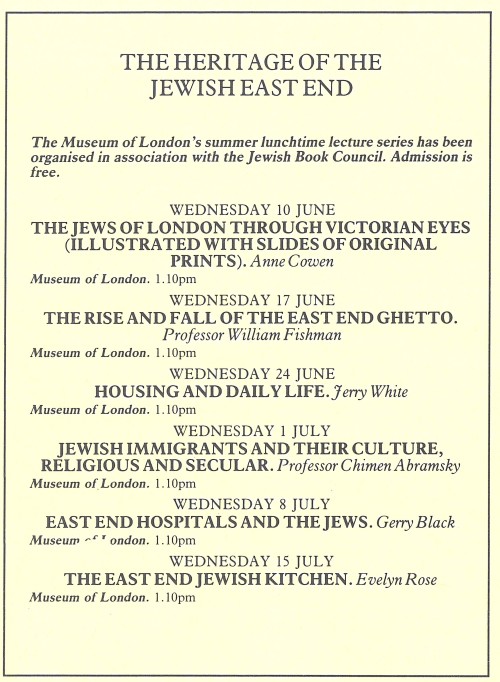
Jewish Book Council summer lunchtime lecture series advertisement, 1987 [MS385 A4040/2/3]
The exhibitions at Jewish Book Week have also developed over time with a trade day provided for publishers, booksellers, and librarians. Jewish Book Week has become such a big event in the Jewish community, that Jewish publishers time the release of books of Jewish interest to fall on the dates of the event.
![Jewish Book Week exhibition leaflet, 1971 [MS385 A4040 3/1]](https://specialcollectionsuniversityofsouthampton.files.wordpress.com/2018/12/Jewish-Book-Council-Exhibition-Leaflet-1971-MS385-A4040-3_1.jpg?w=500)
Jewish Book Week exhibition leaflet, 1971 [MS385 A4040/3/1]
![An entry for the Jewish Book Council poetry competition c.1993 [MS385 A4040 3/20/2]](https://specialcollectionsuniversityofsouthampton.files.wordpress.com/2018/12/JBC-Poetry-Competition-Entry-Section-c.1993-MS385-A4040-3_20_2.jpg?w=500)
Part of an entry for the Jewish Book Council poetry competition c.1993 [MS385 A4040 3/20/2]
In 1979, the Council experienced financial difficulties and was almost forced to close down. Determined to keep the Council going, chairman of the Council at the time, Joe Lehter, helped make the executive decision for the organisation to operate on a voluntary and independent basis. Following this change, many people have served on the executive committee and have worked tirelessly to keep the event going and make it prosper. In recent years the Council has come to a sponsorship arrangement with the Jewish Chronicle.
![Jewish Book Week leaflet reflecting sponsorship by Jewish Chronicle, 1994 [MS385 4040 4/2]](https://specialcollectionsuniversityofsouthampton.files.wordpress.com/2018/12/Jewish-Book-Week-leaflet-1994-MS385-A4040-4_2.jpg?w=500)
Jewish Book Week leaflet reflecting sponsorship by Jewish Chronicle, 1994 [MS385 A4040/4/2]
![Jewish Book Council Newsletter [MS385 A4040 2/2]](https://specialcollectionsuniversityofsouthampton.files.wordpress.com/2018/12/Jewish-Book-Council-Newsletter-MS385_A4040_2_2.jpg?w=500)
Jewish Book Council Newsletter, 1986 [MS385 A4040/2/2]
The Jewish Book Council collection that we hold mainly contains material relating to Jewish Book week, 1952-2004, together with papers relating to the formation of the trust and charitable status, council minutes, 1974-87, correspondence, reports and accounts.
Here is a quote from a letter written from Motzoei Shabbat Vayikra to Dr Geo J. Webber, founder of the Jewish Book Council, 15 March 1975 [MS 385 A4040 2/1] :
“A magnificent book week. Lectures good, attendances excellent and to me, more important than all else sales of £1, 220 worth of books which means that more people will have more books to take home and who knows – read. In addition I have been invited to set up book-selling units in the J.F.S. and at Carmel College. Also perhaps bookstalls at Jewish Youth Clubs… In all events at no time between 9.50 am and 10.30pm was there less than six or seven people looking at the books… Some people returned three and four times.”
You can find out more about how Jewish Book Week takes place today at the following webpages:
http://www.jewishbookweek.com/
https://vimeo.com/jewishbookweek
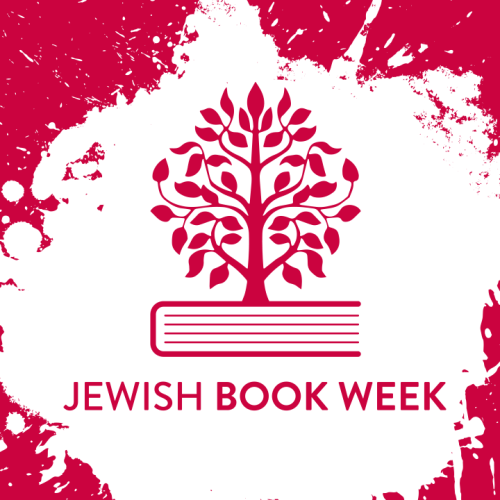
Jewish Book Week Logo

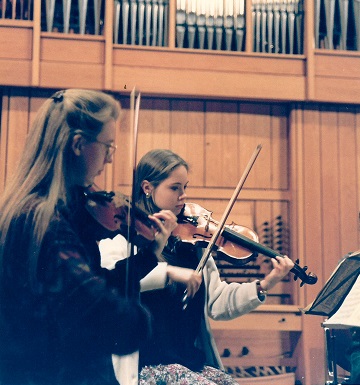

![Questionnaire from reverberation test on Turner Sims Concert Hall [MS373 A3048/3]](https://specialcollectionsuniversityofsouthampton.files.wordpress.com/2018/12/ms373_a3048_3violin_crop.jpg?w=500)

![Lord Louis Mountbatten on a polo pony, New Barnet, 1923 [MB1/L2/92]](https://specialcollectionsuniversityofsouthampton.files.wordpress.com/2018/12/mb2-l2_92-for-blog-post.jpg?w=500)
![Lord Louis Mountbatten and the rest of the Warspite polo team, Mandelieu Polo Club, c. January 1927 [MB2/L4/210]](https://specialcollectionsuniversityofsouthampton.files.wordpress.com/2018/12/mb2_l4_210-for-blog-post.jpg?w=500)
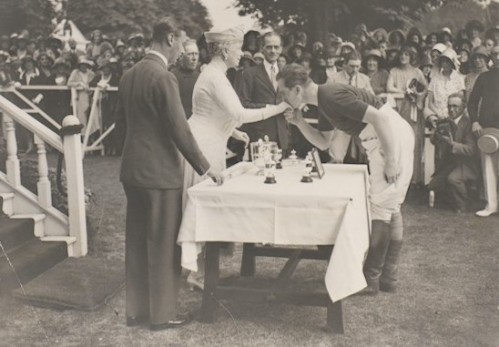
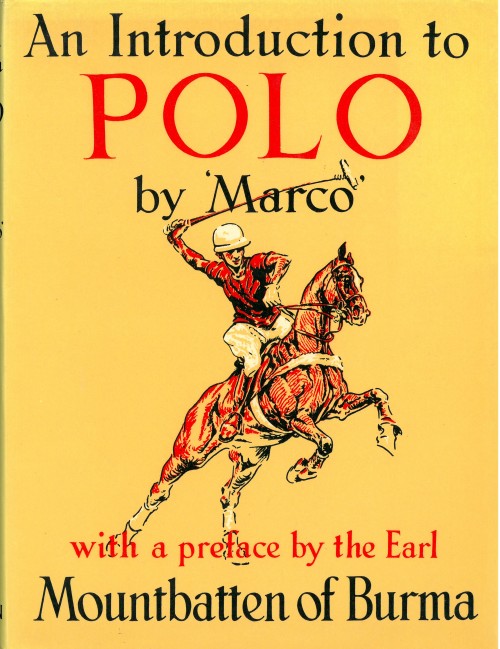
![Proposed International Rules of Polo, 1938 [MB1/L310]](https://specialcollectionsuniversityofsouthampton.files.wordpress.com/2018/12/mb1_l310.jpg?w=500)
![Malta Polo Club Rundle Cup Programme, 4 March 1967 [MB1/L292]](https://specialcollectionsuniversityofsouthampton.files.wordpress.com/2018/12/ms-62-mb1_l292-for-blog-post.jpg?w=500)
![Lord Louis Mountbatten's polo team, the "Shrimps", after winning the Keyes Cup, Malta, 31 December 1928 [MB1/L4/166]](https://specialcollectionsuniversityofsouthampton.files.wordpress.com/2018/12/mb2-l4_-cherring-after-victory.jpg?w=500)
![Men's football team, 1953-4 [photo_MS1_7_291_22_4] Men's football team, 1953-4 [photo_MS1_7_291_22_4]](https://live.staticflickr.com/65535/50089268168_f26eed63ef_s.jpg)
![Women's rowing team, 1961-2 [MS1_7_291_22_4] Women's rowing team, 1961-2 [MS1_7_291_22_4]](https://live.staticflickr.com/65535/50090079577_3b7acbde42_s.jpg)
![Men's rugby team, 1953-4 [MS1_7_291_22_4] Men's rugby team, 1953-4 [MS1_7_291_22_4]](https://live.staticflickr.com/65535/50089268523_4f2c587220_s.jpg)
![Women's hockey team, 1953-4 [MS1_7_291_22_4] Women's hockey team, 1953-4 [MS1_7_291_22_4]](https://live.staticflickr.com/65535/50090079692_28114e9c7d_s.jpg)